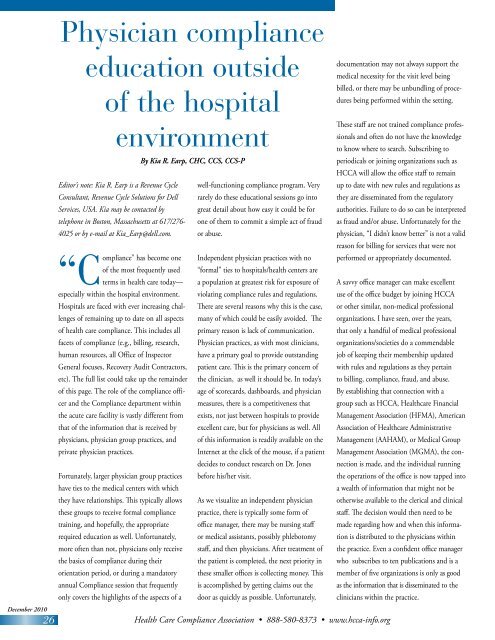Steven Baruch - Health Care Compliance Association
Steven Baruch - Health Care Compliance Association
Steven Baruch - Health Care Compliance Association
You also want an ePaper? Increase the reach of your titles
YUMPU automatically turns print PDFs into web optimized ePapers that Google loves.
December 2010<br />
26<br />
Physician compliance<br />
education outside<br />
of the hospital<br />
environment<br />
Editor’s note: Kia R. Earp is a Revenue Cycle<br />
Consultant, Revenue Cycle Solutions for Dell<br />
Services, USA. Kia may be contacted by<br />
telephone in Boston, Massachusetts at 617/276-<br />
4025 or by e-mail at Kia_Earp@dell.com.<br />
has become one<br />
of the most frequently used<br />
“<strong>Compliance</strong>”<br />
terms in health care today—<br />
especially within the hospital environment.<br />
Hospitals are faced with ever increasing challenges<br />
of remaining up to date on all aspects<br />
of health care compliance. This includes all<br />
facets of compliance (e.g., billing, research,<br />
human resources, all Office of Inspector<br />
General focuses, Recovery Audit Contractors,<br />
etc). The full list could take up the remainder<br />
of this page. The role of the compliance officer<br />
and the <strong>Compliance</strong> department within<br />
the acute care facility is vastly different from<br />
that of the information that is received by<br />
physicians, physician group practices, and<br />
private physician practices.<br />
Fortunately, larger physician group practices<br />
have ties to the medical centers with which<br />
they have relationships. This typically allows<br />
these groups to receive formal compliance<br />
training, and hopefully, the appropriate<br />
required education as well. Unfortunately,<br />
more often than not, physicians only receive<br />
the basics of compliance during their<br />
orientation period, or during a mandatory<br />
annual <strong>Compliance</strong> session that frequently<br />
only covers the highlights of the aspects of a<br />
By Kia R. Earp, CHC, CCS, CCS-P<br />
well-functioning compliance program. Very<br />
rarely do these educational sessions go into<br />
great detail about how easy it could be for<br />
one of them to commit a simple act of fraud<br />
or abuse.<br />
Independent physician practices with no<br />
“formal” ties to hospitals/health centers are<br />
a population at greatest risk for exposure of<br />
violating compliance rules and regulations.<br />
There are several reasons why this is the case,<br />
many of which could be easily avoided. The<br />
primary reason is lack of communication.<br />
Physician practices, as with most clinicians,<br />
have a primary goal to provide outstanding<br />
patient care. This is the primary concern of<br />
the clinician, as well it should be. In today’s<br />
age of scorecards, dashboards, and physician<br />
measures, there is a competitiveness that<br />
exists, not just between hospitals to provide<br />
excellent care, but for physicians as well. All<br />
of this information is readily available on the<br />
Internet at the click of the mouse, if a patient<br />
decides to conduct research on Dr. Jones<br />
before his/her visit.<br />
As we visualize an independent physician<br />
practice, there is typically some form of<br />
office manager, there may be nursing staff<br />
or medical assistants, possibly phlebotomy<br />
staff, and then physicians. After treatment of<br />
the patient is completed, the next priority in<br />
these smaller offices is collecting money. This<br />
is accomplished by getting claims out the<br />
door as quickly as possible. Unfortunately,<br />
<strong>Health</strong> <strong>Care</strong> <strong>Compliance</strong> <strong>Association</strong> • 888-580-8373 • www.hcca-info.org<br />
documentation may not always support the<br />
medical necessity for the visit level being<br />
billed, or there may be unbundling of procedures<br />
being performed within the setting.<br />
These staff are not trained compliance professionals<br />
and often do not have the knowledge<br />
to know where to search. Subscribing to<br />
periodicals or joining organizations such as<br />
HCCA will allow the office staff to remain<br />
up to date with new rules and regulations as<br />
they are disseminated from the regulatory<br />
authorities. Failure to do so can be interpreted<br />
as fraud and/or abuse. Unfortunately for the<br />
physician, “I didn’t know better” is not a valid<br />
reason for billing for services that were not<br />
performed or appropriately documented.<br />
A savvy office manager can make excellent<br />
use of the office budget by joining HCCA<br />
or other similar, non-medical professional<br />
organizations. I have seen, over the years,<br />
that only a handful of medical professional<br />
organizations/societies do a commendable<br />
job of keeping their membership updated<br />
with rules and regulations as they pertain<br />
to billing, compliance, fraud, and abuse.<br />
By establishing that connection with a<br />
group such as HCCA, <strong>Health</strong>care Financial<br />
Management <strong>Association</strong> (HFMA), American<br />
<strong>Association</strong> of <strong>Health</strong>care Administrative<br />
Management (AAHAM), or Medical Group<br />
Management <strong>Association</strong> (MGMA), the connection<br />
is made, and the individual running<br />
the operations of the office is now tapped into<br />
a wealth of information that might not be<br />
otherwise available to the clerical and clinical<br />
staff. The decision would then need to be<br />
made regarding how and when this information<br />
is distributed to the physicians within<br />
the practice. Even a confident office manager<br />
who subscribes to ten publications and is a<br />
member of five organizations is only as good<br />
as the information that is disseminated to the<br />
clinicians within the practice.

















